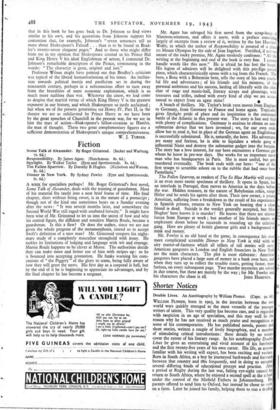Fiction
Some Talk of Alexander. By Roger Grinstead. (Seeker and Warburg. Responsibility. By James Agate. (Hutchinson. 8s. 6d.) 7s. 6d.) Spylight. By Walker Taylor. (Eyre and Spottiswoode. 8s. 6d.) The Fallen Sparrow. By Dorothy B. Hughes. (Nicholson and Watson. 8s. 6d.) Dinner in New York. By Sydney Fowler. (Eyre and Spottiswoode. 8s. 6d.)
A WEEK for specialists perhaps! Mr. Roger Grinstead's first novel, Some Talk of Alexander, deals with the training of guardsmen. Most
of his material fits tautly into a neat brief frame of time. His final chapter, short without being sweet, is in the nature of a postscript ; though not of the kind one sometimes hears on a Sunday evening after the news : " It was several months later, and somewhere the Second World War still raged-with unabated ferocity." It might have been wise of Mr. Grinstead to let us into the secret of how and why his central figure, the diffident and sensitive Martin Roule, became a guardsman. Is this a flaw? Or does the author, since we are not given the whole progress of the metamorphosis, intend us to accept Swift's definition of a nice man? Mr. Grinstead tempers his night- mare study of a completely masculine stronghold with irony. He tackles its limitations of lodging and language with wit and courage. Martin Roule happens to be clever at Morse. The authorities decide they can make more and better use of him with stripes up : so he is bounced into accepting promotion. He funks warning his com- panions of "the Piggery" of the glory to come, being fully aware of how they will greet the news. His first day as a corporal is hell, but by the end of it he is beginning to appreciate its advantages, and by the final chapter he has become a sergeant..
Mr. Agate has salvaged his first novel from the scrap-heap of Nineteen-nineteen, and offers it anew, with a preface consisting largely of excerpts from a review of it, written by the late Humbert Wolfe, in which the author of Responsibility is assured of a place on Mount Olympus by the side of Jean Ingelow. Fortified, if not too secure of the rocky premise, Mr. Agate modestly confesses : "All the writing at the beginning and end of the book is very fine. I cannot handle words like this now." He is afraid he has lost the knack. His legion of admirers will be delighted with this pre-Ego period piece, which characteristically opens with a tag from the French. The hero, a Beau with a Bohemian bent, tells the story of his own youth- ful life and adventures ; of his friends and his mistress, of his personal ambitions and his success, larding all liberally with the chit- chat of stage and music-hall, literary scraps and gleanings, with treasures and trifles, indeed with every kind of chip we are accus-
tomed to expect from an agate mine! •
A bunch of thrillers. Mr. Taylor's brisk yarn moves from England to Germany, from Germany to France and home again. Topicality gives Spylight pride of place and its inspiration is the continued battle of the Atlantic in this present war. The story is fast and slick with plenty of complications. Germany is anxious to obtain an anti- submarine device that we have invented ; we, for our own ends allow her to steal it, but in place of the German agent an Englishman is successfully substituted. He is, naturally, the hero. His adventures are many and furious, he is able to liquidate a whole gang of influential Nazis and destroy the submarine gadget into the bargain The story has a love interest, for our hero encounters a German girl whom he knew in pre-war days. She works for an important naval man who has headquarters in Paris. She is most useful, but gets murdered eventually. The book ends with our hero: "one of the first troops to scramble ashore on to the rubble that had once been Pantellaria."
The Fallen Sparrow, as readers of The So Blue Marble will expect. is an even more exotic specimen of thrillery. It opens in Spain, has an interlude in Portugal, then moves to America in the days before the war. Hidden treasure, in the nature of Babylonian relics, tempt Hitler and he sends his agents after them. Their new owner, a young American, suffering from a breakdown as the result of his experiences in Spanish prisons, returns to New York on hearing that a close friend is dead. Suicide is the verdict generally accepted, but Miss Hughes' hero knows it is murder! He knows that there are sinister forces from Europe at work ; but another of his friends meets an unpleasant doom before he succeeds in rounding up the crimiml gang. Here are plenty of brittle glamour girls and a background of mink and money.
Mr. Fowler is an old hand at the game, in consequence his even more complicated scramble Dinner in New York is Old with an
airy matter-of-factness which all tellers of tall stories will envy.
American gangsters in London and English financiers in New York are the main characters. The plot is most elaborate: American gangsters have placed a large sum of money in a bank over here, and when they turn up to collect the trouble starts, getting faster, more furious, on every subsequent page. Two murder mysteries are solved in due course, but these are merely by the way ; for Mr. Fowler and


























 Previous page
Previous page